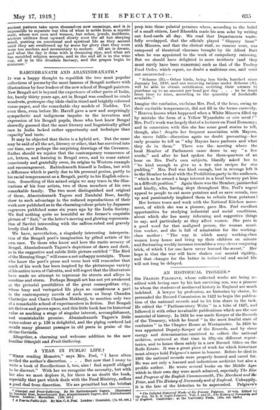A YEAR IN PUBLIC LIFE.t
"WREN reading Memoirs," says Mrs. Peel, "I have often reviled the author's discretion. . . . But now that I essay to write a book of Recollections I, too, alas I find myself obliged to be discreet." With her we recognize the necessity, but with her also we must deplore it, for there is no doubt the book, especially that part which deals with the Food Ministry, suffers a good deal from discretion. We are permitted but the briefest by*Na=l °ad Brait-Gathersty. By sir Rabindransth Tagere. Illustrated Hose, Surendranath Kar, Abanindramth Tagore, and Nsbindranath name. London : Macmillan. 110e. net.1 Peoria Plattic Life. By Mrs. 0.8. real. London: Constable. [71. Od. sem peep into those palatial premises where, according to the belief of a small citizen, Lord Rhondda made his arm ache by writing out food-cards all day. We read that Departments waste- fully overlapped, that the officials played "Slippery Anne" with Minutes, and that the clerical staff, so rumour went, was composed of theatrical choruses brought by Sir Alfred Butt when he was appointed to the work of compulsory rationing. But we should have delighted in more incidents (and they must surely have been numerous) such as that of the Poultry Food Order, which report, no doubt a malicious one, said went out uncorrected :— " Scheme (B).— Other birds, being hen birds, hatched since January 1st, 1916, and not receiving rations under Scheme (A), will be able to obtain certificates, entitling their owners to purchase up to an amount per head per day . . . to be fixed fronsitr, to time, according to the quantity of foodstuffs la Imagine the confusion, exclaims Mrs. Peel, if the hens, owing to their excitable temperament, did not fill in the forms correctly.
Heaven knows what happened when a White Minorca filled up by mistake the form of a Yellow Wyandotte or vice versd 1" Mrs. Peel's work was largely that of a lecturer on Food Economy; and in connexion with this she has some good stories to tell, though, alas ! despite her frequent association with Mayors, she never fulfils--disoretion again no doubt preventing—her early promise to tell us "why Mayors have parlours and what they do in them." There was the • meeting where the local Member of Parliament came down to say "a few words," and after he had spoken for three-quarters of an hour on Mrs. Peel's own subjects, blandly asked her to "bit kind enough to give us a few nice recipes for rice pudding." Mrs. Peel was kind enough, but in revenge left it to the Member to deal with the Prohibition party in the audience, "which as he owned a large interest in a local brewery put him in a difficult position." Again there was the Member, patriarchal and kindly, who, having slept throughout Mrs. Peel's urgent appeal to people to eat more potatoes and so save cereals, rose up and passionately implored them to refrain from potatoes !
Her lecture tours and work with the National Kitchen move- ment, of which she was a pioneer, gave Mrs. Peel excellent opportunities for studying industrial and social conditions, about which she has many informing and suggestive things' to say, and particularly as they affect women. She puts in a good word for that maligned person, the woman muni- tion worker, and she is full of admiration for the working- class mother: "The way in which many working-class women keep house and bring up their children on minute and fluctuating weekly incomes resembles a very clever conjuring trick, of which I for one have never learned the secret." Her hope is that the war will have shaken our mental rigidity, and that changes for the better in industrial and social life will not long be delayed.


































 Previous page
Previous page